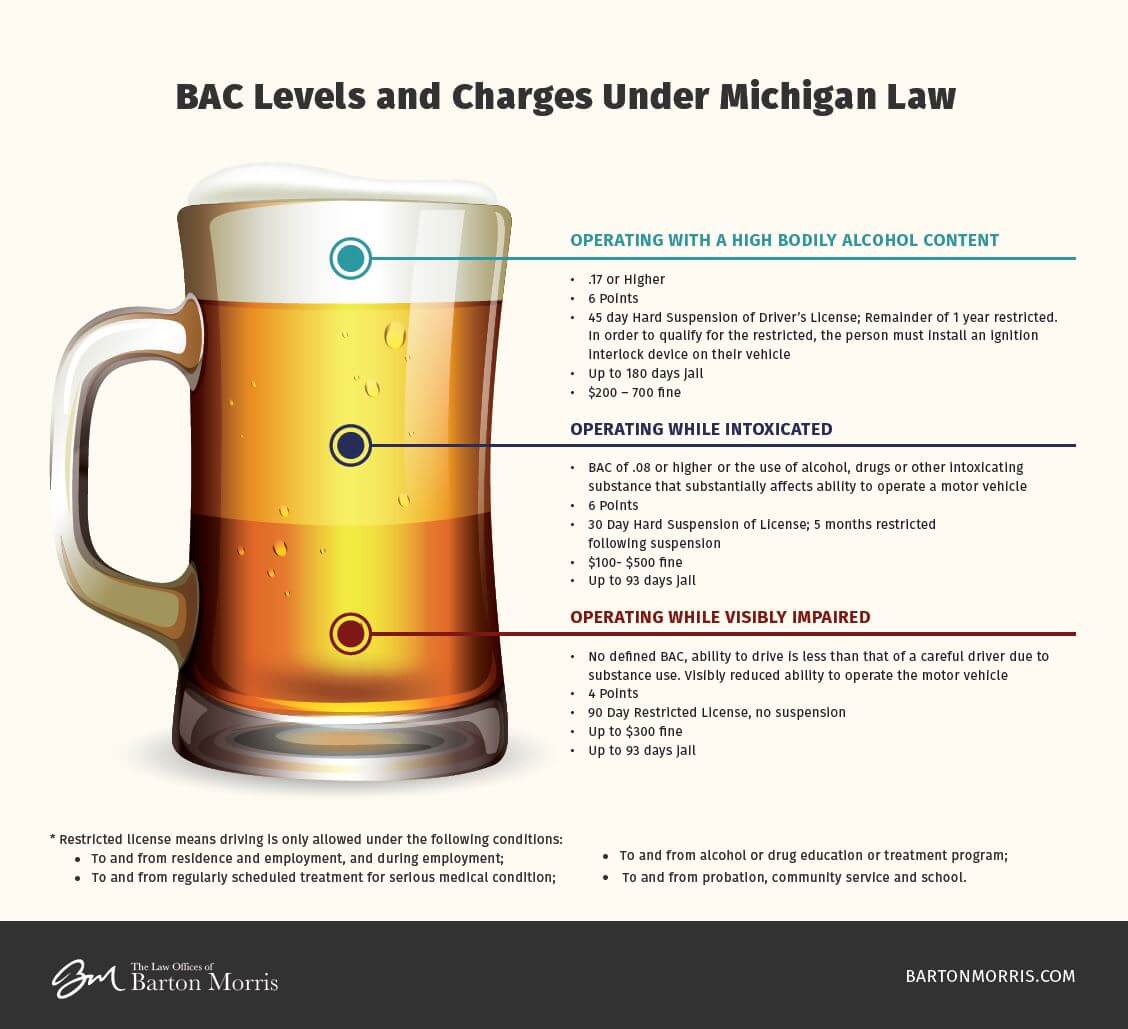DUI & Alcoholism Resources
Michigan DUI Laws: What to Know
Are you facing DUI charges? Unhappy with your current attorney? Request a free consultation now.

According to Michigan DUI laws, an OWI can be charged when an impaired person puts the vehicle in a significant risk of causing collision (i.e. if the engine is on and if the vehicle is in gear).
While this typically involves driving your car on the road, you can also get a DUI charge in Michigan simply by sitting in a parked car while intoxicated.
Drunk Driving Statistics
- Every day, 29 people in the United States die in motor vehicle crashes that involve an alcohol-impaired driver. That is one death every 50 minutes.
- In 2010, the most recent year for which cost data is available, these deaths and damages contributed to a cost of $44 billion that year.
- In 2017, deaths related to alcohol-impaired driving in Michigan shot up from 244 the previous year to 311 – a 22-percent rise.
Michigan DUI Laws Include Mandatory DUI Classes
Anyone charged with substance use, related traffic offense may be required to obtain an alcohol screening or substance abuse evaluation, or participate in awareness classes.
Offenses that may require assessments and/or classes include:
- Driving Under the Influence (DUI)
- Operating While Intoxicated (OWI)
- Operating with an Unlawful Bodily Alcohol Content (UBAC)
- Impaired Driving
- Open Intoxicants in a Motor Vehicle
- Person Under 21 purchase/consume/possess/transport Alcohol
- Use of Fraudulent ID to Purchase Liquor
- Person deemed a Habitual Alcohol Offender
The first level is approximately eight hours of classes. In Michigan, you can search assessment and class providers by county.

Alcoholism Hotlines/Support Groups
A few indicators that you may need to seek help include:
- You have alcohol cravings that are hard to fight on your own
- Drinking causes problems in your life, but you don’t know if you should stop
- You feel more depressed or anxious after drinking
- Drinking alcohol is one of your top priorities
- You’ve experienced alcohol poisoning or overdose
- You’ve been arrested for driving drunk before
Below are free, reputable 24/7 alcoholism hotlines awaiting your call:
DrugRehab.com
24/7 Help at (877) 589-4784
Substance Abuse and Mental Health Services Administration (SAMHSA) National Helpline
1-800-662-4357 (HELP)
Addiction Treatment
1-866-537-6322
National Council on Alcoholism and Drug Dependence (NCADD)
1-800-622-2255
DrugRehab.com Alcoholism Treatment Line
1-855-789-9197
Starfish Family Services (Headquarters)
3000 Hively Inkster, MI 48141
(734) 728-3400
Metro-Detroit Counseling Centers & Other Helpful Organizations
Founded in 1935, AA is nonprofessional, self-supporting and apolitical.
There are no age or education requirements.
The only membership requirement?
To have a desire to stop drinking.
“Twelve Steps of Alcoholics Anonymous” is a book made popular by AA when it first published in 1939.
This group of principles has since helped millions of men and women recover from alcoholism.
The AA program is rooted in the Twelve Steps and its principles.
Here’s a typical AA meeting agenda:
1. AA Members share their experience with anyone seeking help with a drinking problem; they give person-to-person service (“sponsorship”) to the alcoholic coming to AA from any source.
2. The AA program offers alcoholics a way to develop a satisfying life without alcohol.
3. This program is discussed at AA group meetings, which encompass open speaker meetings, open discussion meetings, closed discussion meetings, step meetings (usually closed) and correctional/treatment facility meetings.
To find your local AA chapter, search this national directory provided by AA.
Schedule Your Free Consultation Today
Free Consultation
